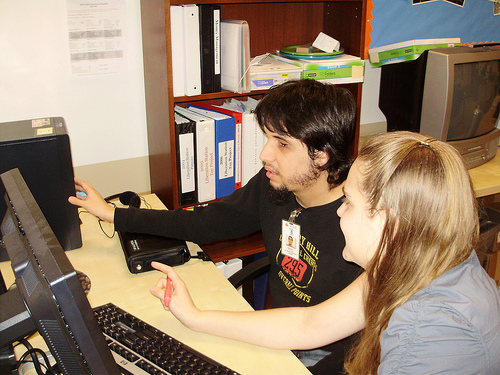


Next week, the U.S. Department of Education Office of Special Education and Rehabilitative Services will host the 2012 National Transition Conference, bringing together federal agencies, community rehabilitation services, employment professionals individuals with disabilities and their families, and others to, as the website puts it, “improve the transition from school to adult life for young adults with disabilities.”
In his guest blog post on the Disability.gov website, assistant to the President’s Committee for People with Intellectual Disabilities, Madjid Karimi, provides details about Project SEARCH, which will be the subject of an interactive panel presentation at the conference. Now in its third year, Project SEARCH helps urban youth with disabilities transition from high school into jobs within federal agencies. The success of the program rests largely on the shoulders of individuals like Vander Cherry, whom Karimi quotes to illustrate the merits of Project SEARCH:
My goal on my job is being able to be a role model to a lot of people, and being able to better myself every day for the workplace so I won’t have anybody coming up to me and telling me how to do my job. I want to be an asset to the office. I want them to call me in to be there because they need me to be there in the office for a specific reason, because they cannot do without me.
There’s that phrase we’ve been exploring all week: role model. For an individual with a disability, the perception of being successful at a job is frequently more than just excelling at the expected tasks. Notice Cherry says he is a role model to “a lot of people,” not just people like him. For Cherry to be a valued employee, in his mind, he must perform in a way that imparts to his co-workers the capabilities of all people with disabilities, as well as their positive attitudes and reliability.
Yesterday we wrote about Katie Beckett, who from pre-adolescence had to perform as a representative of young people with disabilities when all she wanted to do was to be a kid. Vander Cherry and any other Project SEARCH participants have the same pressure of being evaluated on how they navigate a system that, up until recently, has not been geared toward their needs.
Whether or not this is a fair expectation is less important than the fact that so many people with disabilities feel up to the challenge, and are willing to assume the mantle of representation for their peers, and show that, when given the right career training and job opportunities, they are more than equal to the task.
Comments?
Image by Dell, Inc., used under its Creative Commons license.